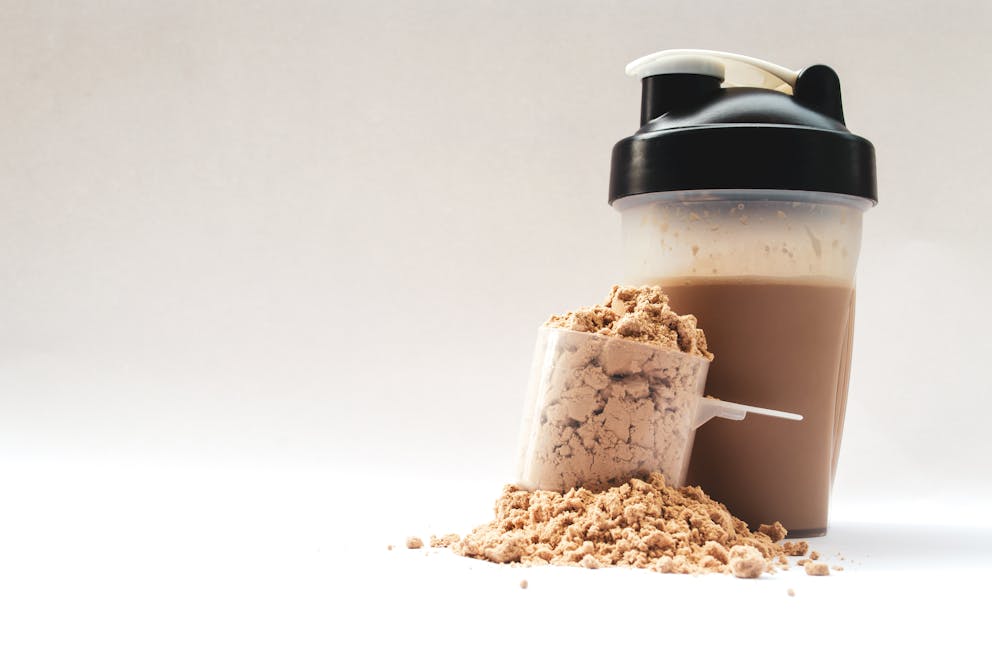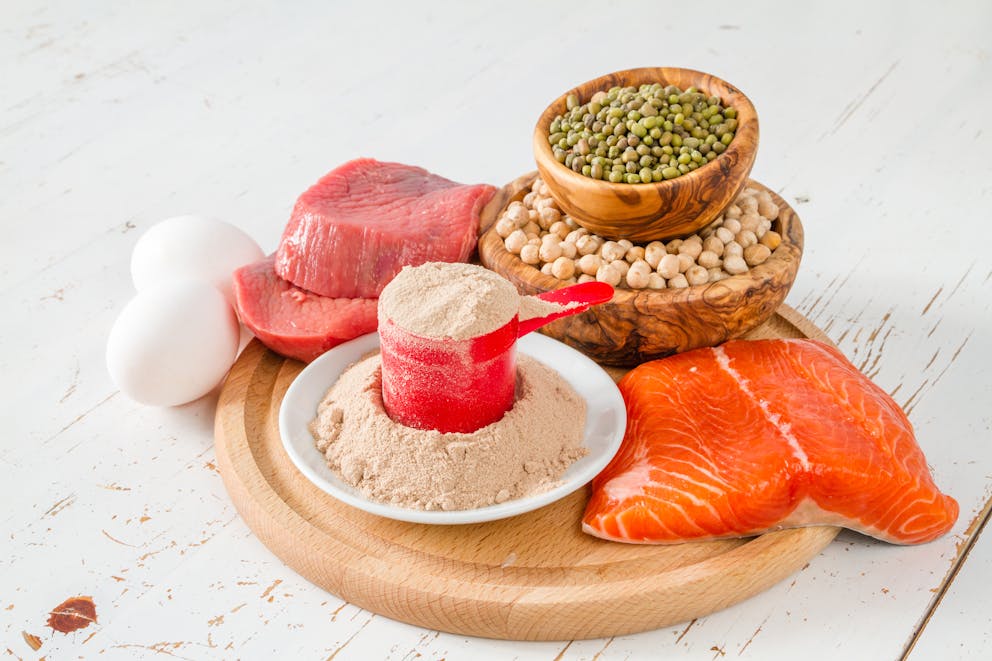The Protein That Spikes Insulin More than White Bread

Junk Food: The Truth About Ultra-Processed Food
Learn about the detrimental impact of ultra-processed foods on health and well-being
Discover the top four dangerous hidden ingredients in everyday foods
Understand the health risks associated with consuming ultra-processed foods
Recognize misleading nutrition labels to make informed dietary choices
Get practical tips for choosing minimally processed whole foods for better health

Junk Food: The Truth About Ultra-Processed Food
Learn about the detrimental impact of ultra-processed foods on health and well-being
Discover the top four dangerous hidden ingredients in everyday foods
Understand the health risks associated with consuming ultra-processed foods
Recognize misleading nutrition labels to make informed dietary choices
Get practical tips for choosing minimally processed whole foods for better health

Junk Food: The Truth About Ultra-Processed Food
Learn about the detrimental impact of ultra-processed foods on health and well-being
Discover the top four dangerous hidden ingredients in everyday foods
Understand the health risks associated with consuming ultra-processed foods
Recognize misleading nutrition labels to make informed dietary choices
Get practical tips for choosing minimally processed whole foods for better health

Junk Food: The Truth About Ultra-Processed Food
Learn about the detrimental impact of ultra-processed foods on health and well-being
Discover the top four dangerous hidden ingredients in everyday foods
Understand the health risks associated with consuming ultra-processed foods
Recognize misleading nutrition labels to make informed dietary choices
Get practical tips for choosing minimally processed whole foods for better health

Junk Food: The Truth About Ultra-Processed Food
Learn about the detrimental impact of ultra-processed foods on health and well-being
Discover the top four dangerous hidden ingredients in everyday foods
Understand the health risks associated with consuming ultra-processed foods
Recognize misleading nutrition labels to make informed dietary choices
Get practical tips for choosing minimally processed whole foods for better health

Junk Food: The Truth About Ultra-Processed Food
Learn about the detrimental impact of ultra-processed foods on health and well-being
Discover the top four dangerous hidden ingredients in everyday foods
Understand the health risks associated with consuming ultra-processed foods
Recognize misleading nutrition labels to make informed dietary choices
Get practical tips for choosing minimally processed whole foods for better health
The Protein That Spikes Insulin More than White Bread
Ever wondered how that scoop of whey protein you're adding to your post-workout shake impacts your insulin levels? Well, let's dive into the deep end together.
You might think it’s just a quick and convenient source of protein, right? But there's more going on under the hood than meets the eye. This isn't about scaring you off your beloved whey - quite the contrary. It's about arming you with knowledge to make informed decisions for yourself.
We'll uncover why this milk byproduct may mess around with our bodies' sugar control system, possibly affecting weight gain and even ketosis. We’ll also compare its nutritional profile against natural food sources like eggs or fish.
Hold on tight, as this thrilling journey is about to begin!
The Impact of Whey Protein on Insulin Levels
An in-depth exploration of how whey protein affects insulin levels, including its potential benefits and drawbacks for health and fitness enthusiasts.
The Insulin Response to Whey Protein
Did you realize that taking whey protein can result in a considerable rise in your insulin levels? Studies have shown that whey protein powder increases insulin by 139%. That's more than the effect of white bread, which spikes insulin by only 87%.
But don't panic just yet. Unlike many foods that raise insulin, whey protein doesn't spike blood sugar. This unique attribute could benefit people trying to manage their glucose levels.
The Role of Glucagon
You might ask: "Isn't high insulin bad?" Well, it's not as simple as that because another player enters the game - glucagon. Some studies suggest this hormone is stimulated by whey and may counteract some effects of raised insulin.
In other words, even though your body produces more insulin after drinking a shake made from whey protein powder, it also creates glucagon, which helps balance things out. A fascinating balancing act indeed.
Whey Protein and Ketosis
If you're on a low-carb diet, it's essential to understand how different foods affect your body. Let's talk about whey protein. This popular supplement can knock you out of ketosis because it increases insulin levels.
But wait, there's more. Despite its potential effect on ketosis, studies have shown that consuming whey protein after a meal may help lower blood sugar levels. This could benefit those trying to manage their glucose intake or lose weight.
Personal experimentation is critical when considering dietary supplements like whey protein while following a ketogenic diet. Just remember: everybody responds differently.

The Relationship Between Whey Protein and Weight Gain
It's a common misconception that consuming whey protein automatically leads to weight gain. Contrary to what is widely assumed, the reality is more intricate. Contrary to popular belief, whey protein does not directly convert glucose into fat.
This might seem surprising given our general understanding of diet and nutrition. After all, aren't proteins supposed to build mass?
While it's true that proteins are vital for muscle growth and recovery after workouts - they don’t necessarily contribute directly to unwanted fat accumulation.
Research suggests the opposite effect can occur: whey protein intake may help control hunger, thereby reducing overall calorie consumption and aiding weight loss efforts.
Potential Benefits of Whey Protein for Individuals with Insulin Resistance
Whey protein may offer surprising benefits for those wrestling with insulin resistance. Let's look at muscle growth first. Consuming whey protein can stimulate muscle development, aiding in glucose metabolism.
According to recent studies, this hormonal effect on the body could be a boon to people grappling with insulin resistance. Yet, it's important to note that exercise often accompanies its consumption and plays a significant role, too.
Muscle Growth Stimulation
One benefit worth considering is the potential for stimulating muscle growth when consuming whey protein. The more your muscles grow, the better they can manage blood sugar levels - an essential aspect of combating insulin resistance.
Impact on Liver Health
We also need to talk about liver health when discussing whey protein. Some research suggests protection against inflammation and lowered liver enzymes due to this nutrient-rich supplement, while others indicate increased levels.

Whey Protein vs. Natural Food Sources
The world of protein isn't just about whey powder. Whole foods like eggs, meat, and fish can also pack a punch.
Let's crunch some numbers: whole eggs, meat, and fish provide better quality amino acids with additional nutrients. Plus, they trigger less insulin response compared to whey protein.
Why does this matter? Lower insulin response due to whey protein intake means you're more likely to stay fat-burning or ketosis if following a low-carb diet.
Moving onto cheese - the underrated muscle builder. It gives us additional nutrients missing in refined products like whey protein powder. Remember those milk commercials growing up? Turns out they were right.
Conclusion
Let's pause and consider the implications of whey protein on insulin levels. It can boost insulin significantly but doesn't spike blood sugar. That’s pretty intriguing!
We also discovered that while it might throw you out of ketosis, it won’t necessarily make you gain weight.
What are the potential benefits for those with insulin resistance? Worth considering! But remember, not all proteins are created equal - natural food sources often offer more nutritional value.
Your journey into understanding how your body reacts to whey protein starts now! Don't avoid personal experimentation; it's critical in this ride. Your health is a lifelong commitment, after all!
Previous blog
Find Out The Deeper Causes of Brittle Nails
Popular
08/21/2024
55K views
02/23/2025
46.3K views
11/18/2024
277.5K views
03/18/2024
11/21/2022




